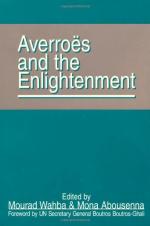|
This section contains 3,574 words (approx. 12 pages at 300 words per page) |

|
Averroes, or ibn Rushd, was the foremost figure in Islamic philosophy's period of highest development (700–1200). His preeminence is due to his own immense philosophical acuity and power and to his enormous influence in certain phases of Latin thought from 1200 to 1650.
Averroes ("ibn Rushd" is a more exact transliteration of the Arabic, while "Averroes" is the medieval Latin version) was born in Córdoba into a family of prominent judges and lawyers; his grandfather, bearing the same name, served as the chief qādī (judge) of Córdoba, and there is a tradition that his father carried out the same duties. (In Muslim society a qādī's professional concepts and practical duties were simultaneously civil and religious. Thus, a "lawyer" had expert knowledge of divine law.)
There are, however, few other specific details about his life and career. Ernest Renan and Salomon...
|
This section contains 3,574 words (approx. 12 pages at 300 words per page) |

|


